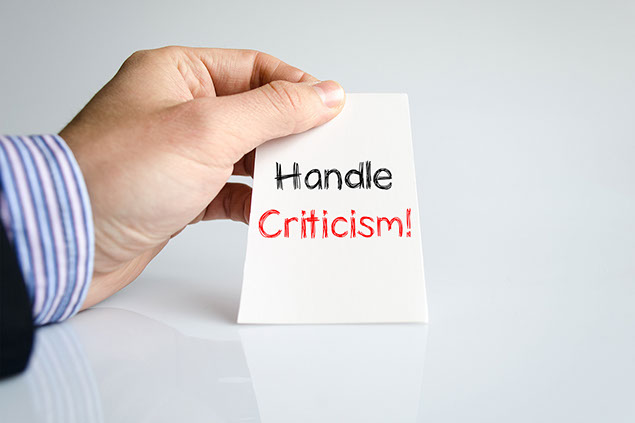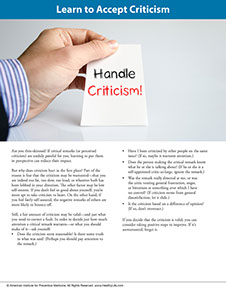Learn to Accept Criticism

Print on Demand
Are you thin-skinned? If critical remarks (or perceived criticism) are unduly painful for you, learning to put them in perspective can reduce their impact.
But why does criticism hurt in the first place? Part of the reason is fear that the criticism may be warranted—that you are indeed too fat, too slow, too loud, or whatever barb has been lobbed in your direction. The other factor may be low self-esteem. If you don’t feel so good about yourself, you’re more apt to take criticism to heart. On the other hand, if you feel fairly self-assured, the negative remarks of others are more likely to bounce off.
Still, a fair amount of criticism may be valid—and just what you need to correct a fault. In order to decide just how much attention a critical remark warrants—or what you should make of it—ask yourself:
• Does the criticism seem reasonable? Is there some truth to what was said? (Perhaps you should pay attention to the remark.)
• Have I been criticized by other people on the same issue? (If so, maybe it warrants attention.)
• Does the person making the critical remark know what he or she is talking about? (If he or she is a self-appointed critic-at-large, ignore the remark.)
• Was the remark really directed at me, or was the critic venting general frustration, anger, or bitterness at something over which I have no control? (If criticism stems from general dissatisfaction, let it slide.)
• Is the criticism based on a difference of opinion? (If so, don’t overreact.)
If you decide that the criticism is valid, you can consider taking positive steps to improve. If it’s unwarranted, forget it.
This website is not meant to substitute for expert medical advice or treatment. Follow your doctor’s or health care provider’s advice if it differs from what is given in this guide.
The American Institute for Preventive Medicine (AIPM) is not responsible for the availability or content of external sites, nor does AIPM endorse them. Also, it is the responsibility of the user to examine the copyright and licensing restrictions of external pages and to secure all necessary permission.
The content on this website is proprietary. You may not modify, copy, reproduce, republish, upload, post, transmit, or distribute, in any manner, the material on the website without the written permission of AIPM.
2019 © American Institute for Preventive Medicine - All Rights Reserved. Disclaimer | www.HealthyLife.com



